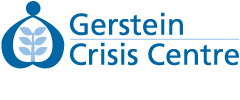
Reflection
As a primarily settler-led organization, we reflect on the ways we have benefited from systems rooted in colonialism, often without questioning the privileges and assumptions that come with that legacy. We recognize that land acknowledgements are only one step. They can become empty words if not paired with intentional action, critical reflection, and a willingness to be uncomfortable as we confront our roles in ongoing colonial systems.
We ask ourselves:
- How have we, even unintentionally, upheld structures that marginalize Indigenous voices?
- Are Indigenous people truly welcomed, heard, and safe in our spaces?
- How can we shift power, resources, and decision-making to be in right relationship with Indigenous communities?
This reflection is not a one-time act. It is a practice, one that demands humility, openness to correction, and a long-term commitment to learning and unlearning.
Land Acknowledgment
We acknowledge that the Gerstein Crisis Centre is situated on the traditional territory of many Nations, including the Mississaugas of the Credit, the Anishnaabeg, the Haudenosaunee, and the Wendat peoples, and is now home to many diverse First Nations, Inuit, and Métis peoples.
Toronto is covered by Treaty 13 signed with the Mississauga’s of the Credit, and the Williams Treaties signed with multiple Mississauga’s and Chippewa bands and is in the territory subject to the Dish With One Spoon Wampum Belt Covenant, an agreement to peaceably share and care for the land, the people and its waters, and all of the biodiversity in the Great Lakes region. All those who come to live and work here are responsible for honouring this treaty in the spirit of peace, friendship, and respect.
We recognize the enduring presence and resilience of Indigenous Peoples and their deep connections to this land. We acknowledge that colonization has not ended for First Nations, Metis and Inuit Peoples of Canada. We also acknowledge the legacy of colonization, systemic injustices, and the ongoing impacts of residential schools and intergenerational trauma, particularly in the context of mental health and crisis support.
As a mental health crisis service provider, we acknowledge our responsibility in addressing these ongoing harms and strive to do better in our work with Indigenous communities.
Our Commitments to Truth and Reconciliation
As part of our ongoing journey toward reconciliation, the Gerstein Crisis Centre commits to:
- Building Cultural Safety We will provide ongoing staff education and training grounded in cultural humility, Indigenous histories, and trauma-informed care.
- Creating Culturally Safe Spaces We will work to ensure our services are inclusive, accessible, and safe for Indigenous clients, guided by the expertise and voices of Indigenous communities.
- Supporting Indigenous-Led Initiatives We will seek partnerships with Indigenous mental health organizations and advocate for equitable funding and representation in the mental health sector.
- Upholding the TRC Calls to Action In particular, we commit to:
- Call to Action 22: Recognizing the value of Indigenous healing practices and collaborating with Elders and Knowledge Keepers in crisis support where appropriate.
- Call to Action 23: Increasing the number of Indigenous professionals in health care and providing opportunities for Indigenous staff to grow and lead.
- Call to Action 57: Ensuring our staff receive education on the history and legacy of residential schools, Treaties, Indigenous rights, and Aboriginal–Crown relations.
- Raising Awareness of the 94 Calls to Action We are committed to making the Truth and Reconciliation Commission’s 94 Calls to Action more visible within our organization and community. As part of this commitment, we will read two Calls to Action aloud at the end of each land acknowledgement, to keep their urgency and importance at the forefront of our collective attention.
- Listening and Learning We are committed to ongoing dialogue with Indigenous communities and welcome feedback, correction, and guidance as we strive to become more accountable and inclusive.
Consultants: Laura Paquette, Algonquin Anishinabeg Nation of Kebaowek First Nation, Michelle Paquette, Ojibwe, Algonquin of Scugog First Nation & Kebaowek First Nation. Danielle Migwans, Ojibwe from M’Chigeeng First Nation

